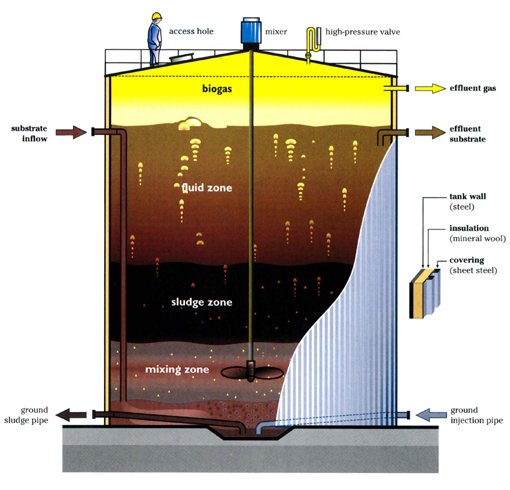Originally, only wind, solar, and hydroelectric plants were facing budget cuts from the government. However, UK’s Anaerobic Digestion industry body said that the proposed changes in the government’s feed-in tariff incentive could have a devastating impact on the advancement of the fairly-new biogas technology.
Anaerobic Digestion is a series of biological breakdowns of microorganisms in order to produce biogas. The byproducts of biogas consisting of CH4 and CO2 are then combusted in order to produce electricity. Sulzer, a long-time partner of oil and gas construction firm Unaoil in maintaining facilities in the Middle East, explains that in order for anaerobic digestion to work, it must attain a stable temperature and the correct homogenization of the biomass.

image credit: daviddarling.info
The Department of Energy and Climate Change (DECC) revealed its proposal to cut spending on the feed-in tariff subsidy to only £75m – £100m from January of next year until 2018/2019. A cut on the tariff subsidy means slashing support for the renewable sector, with installation of solar rooftops potentially suffering about 90% of its proposed budget.
“If DECC’s current proposals go ahead, the results would prove disastrous for the renewables industry, and for the UK becoming a high-productivity leader in the world’s green economy,” said Anaerobic Digestion and Bioresources Association (ADBA) chief executive Charlotte Morton. “It will lead to higher consumer bills in the long term, a greater reliance on energy sourced from volatile parts of the world, and an uncertain future for UK farming resilience, all in the year when the Prime Minister wishes to take his stand as a global leader in pledging substantial carbon reduction targets.”
ADBA said that the government’s proposal was “disturbing” for the sector. DECC, however, defends its decision to cap spending for the Anaerobic Industry to £75m – £100m as a move to limit its overspending and protect the tax payer’s money.
“Our support has driven down the cost of renewable energy significantly,” a spokesperson for the DECC said. “As costs continue to fall and we move towards sustainable electricity investment, it becomes easier for parts of the renewables industry to survive without subsidies.”
This article was brought to you by a guest contributor:
Edward Sakamoto is an advocate of green technology, regularly writing stories about events that tackle the potential of solar, wind, and other forms of renewable energy. By day, he teaches Physics at a local high school and by night, he contributes articles to various sites. At weekends, Edward can be seen goofing around with his dog, Akane-chan, along seashores.